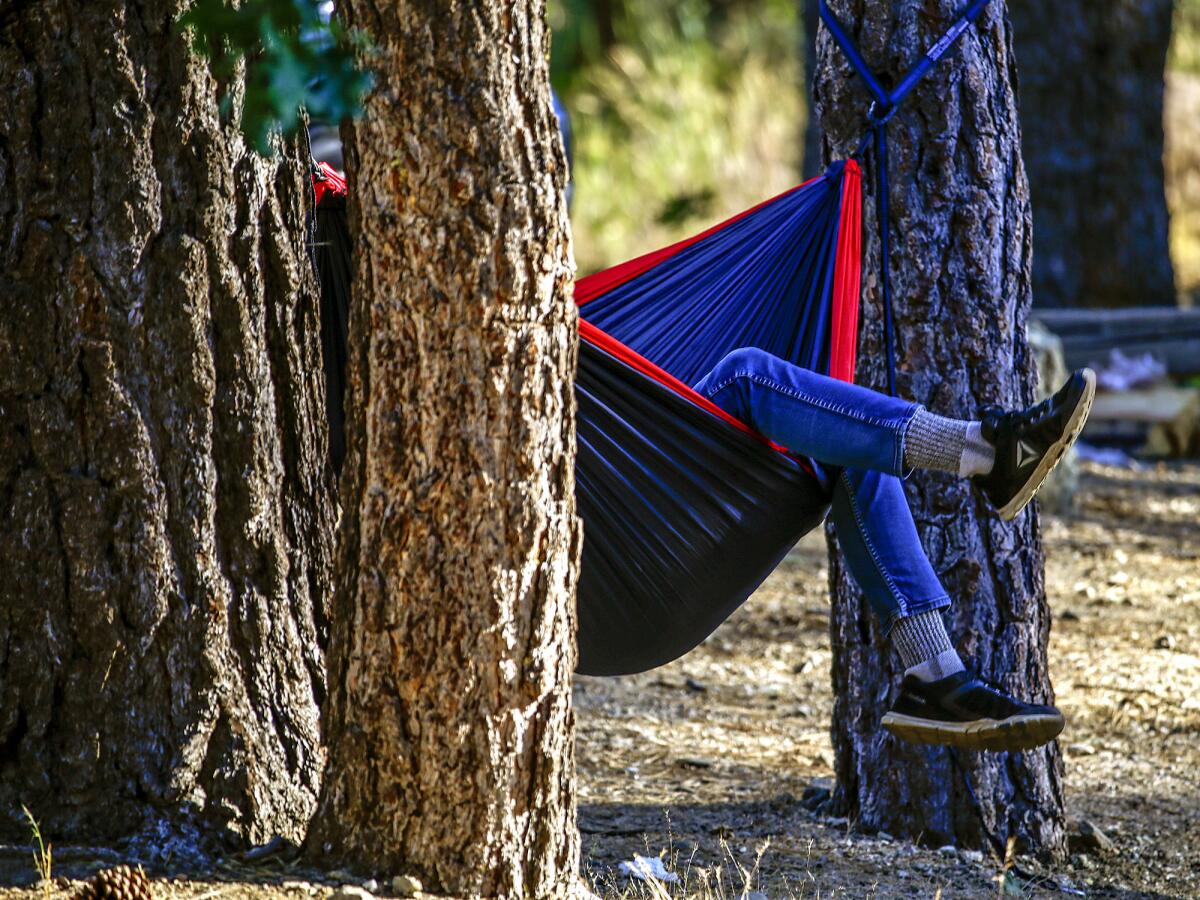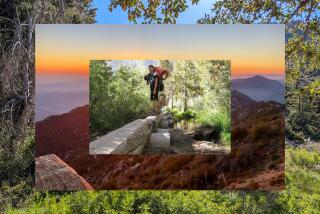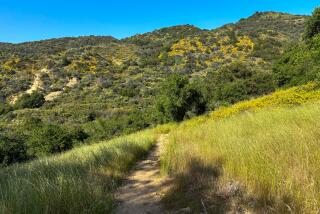Despite coronavirus, many people are ‘going camping. They’re not running away’

As shutdowns, cutbacks and other coronavirus-related troubles led legions of Americans to stay away from hotels and airports, numbers increased at many public and private California campgrounds, their operators said.
“We’ve actually had record bookings the last couple of days,” said Nick Devane, founder and chief executive of Texino, a company that rents and customizes camping vans. The company, based in the L.A. neighborhood of Silver Lake, opened in late 2018.
“I think people want to avoid airports and they want to get away from cities, and camping is a way to do both,” Devane said.
The California State Parks camping reservation system also saw a surge — 97,417 reservations made from Feb. 1-March 11, up from 54,825 during the same period last year, spokesman Jorge Moreno said. During the same period, cancellations dipped from 14,248 to 11,992.
(UPDATE: California’s state park system closed all of its campgrounds on Wednesday, as did Yosemite and Death Valley national parks.)
These figures, Moreno said, may reflect a combination of factors, including this year’s milder weather. (He also noted that through April 15, the park system is waiving any fees for cancellations or modifications because of COVID-19 concerns.)
Meanwhile, at private campgrounds around the West, varied responses included several owners and managers who said their bookings were stable or better.
“If you’re in a campground, you get to choose how much interaction you have with other people. Plus, you’re in nature,” said Dyana Kelley, Auburn-based president of CampCalNow RV Park and Campground Alliance and chief executive of Campground Alliance, which runs the travel-planning website Camp-California.com. “We’re not seeing a decline in camping. ... What we’re seeing is there are significantly higher reservations than normally for this time of year.”
Alyssa Ravasio, founder and chief executive of the outdoors booking site Hipcamp.com, said in a statement Friday, “We haven’t seen a significant impact to our business, although cancellations have risen slightly in the past few days.”
At private RV campgrounds nationwide, “bookings are up by about 4-5%,” said Karen A. Redfern, vice president for brand marketing at the industry group GoRVing.com.
At the Ventura Ranch KOA between Ojai and Santa Paula, which has room for about 148 RVs and 25 tents, owner Scott Cory said February bookings were 14% ahead of last year and the first 11 days of March were 4% ahead of last year.
“Within a month, we’ll probably go up to 95% on weekends,” Cory said.
At Rincon Country RV Resorts West in Tucson, which maintains about 1,100 RV campsites targeted at travelers 55 and older, manager Wendy Bykofsky said her occupancy was also at about 95%, its usual level for March.
Bykofsky did say a few visitors had left the resort early for coronavirus-related reasons, including one couple who headed home to Canada, fearing that the U.S. might close its northern border.
Clint Bell, whose family owns KOA campgrounds in Chula Vista, Temecula and Desert Hot Springs, said he “started to see a more-than-average cancellation rate in the past couple of days” — after the president’s Wednesday TV appearance and Gov. Newsom’s Thursday call for a ban on events of more than 250 people.
That dip seemed to be leveling out by the end of Friday, Bell said.
At Yosemite, Joshua Tree and the state’s seven other national parks, most operations continue as usual, with heightened emphasis on hygiene and some weather-related complications in Southern California.
At Joshua Tree National Park, spokeswoman Hannah Schwalbe said, “We didn’t have a ton of visitation in the park [Thursday], but we also had crazy rain and flash-flooding and we were advising people not to go into the park.” Schwalbe said the flooding has abated and the park’s visitor center, trails and campgrounds will be open as usual this weekend.
Within the hotel industry, occupancy has been dropping. Industry analyst STR reported March 11 that U.S. hotel occupancy March 1-7 dropped 7.3% from the year before, even though rates were 4.6% lower. Those numbers were compiled before President Trump’s March 11 announcement banning most European travelers from entering the U.S. for 30 days starting Friday.
If a traveler is tossing a tent in the car or heading off in an RV, said Jeff Crider, a Palm Desert-based campground and RV industry consultant, “you can always decide for yourself where you want to go and you can change plans at the last minute. ... You could cook all your own meals.”
Although tent campers might be sharing campground restrooms, RV campers do not, Crider said, and “you can limit the amount of exposure you have to other people. … It doesn’t have to be a panic situation.”
Indeed, said Texino’s Devane, his customers “aren’t in a state of panic. They’re going camping. They’re not running away.”
More to Read
Sign up for The Wild
We’ll help you find the best places to hike, bike and run, as well as the perfect silent spots for meditation and yoga.
You may occasionally receive promotional content from the Los Angeles Times.







